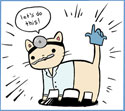|
Khelmar posted:If you want to do ER, Penn is an obvious choice (yes, yes, Pennwes, we know). If you want something exotic, you might talk to Matt Beal at MSU about doing an ER / interventional radiology rotation. Thanks Khelmar! I'll probably start calling/surfing around after my last exam Friday.
|
|
|
|

|
| # ? May 13, 2024 07:15 |
|
Solis posted:Thanks Khelmar! I'll probably start calling/surfing around after my last exam Friday. My wife also says that Cornell and Penn are good for anesthesia. However, if you want to do anything "touristy" while down here (and, let's face it, that's what externships are for!), Penn is not a good choice.  As much as I loathe California, at least Davis is only 4 hours from Yosemite, which is amazing. To all the other vet students: anyone have any cool externships lined up? I went to Edinburgh in Scotland while I was in vet school, which was amazing. Also, Plum Island is an incredible place, so check if your school is part of the Smith-Kilborne program. The FADL course was the best CE I've ever done, and I wish I could go back every year. My wife really enjoyed doing an externship to UF's wildlife program and Minnesota's raptor program.
|
|
|
|
As for bad behavior, one of my classmates was worried that her dog would think that he was dominant over her when she brushed him, because of submissive grooming behavior in wolves. Another said you can never break eye contact with an aggressive dog or they'll think they won.
|
|
|
|
Asstro Van posted:
You have to buy or rent your own full pack? We got given some crappy hemostats, needle drivers and foreceps for free and the school supplied us with instruments for actual surgery. If it's for just practice, don't be afraid to cheap out and buy 'floor grade' stuff off of ebay. It's not THAT horrible and you can get a bunch of different things so if you find out like me that you hate Olsen-Hegars, you're only out 3 bucks.
|
|
|
|
Asstro Van posted:
My school used to have teams either assemble their own packs or buy them from the previous class. SCAVMA has been buying them up instead and renting them out, which is a much better deal, I think. Honestly, you won't use your pack again after the surgery labs. It would need to be cleaned, autoclaved, and maintained/sharpened, and somewhere to use it, and that all tends to come with the necessary instruments. I have needle drivers, a couple hemostats, and forceps, and that was plenty for me to practice suturing and whatnot. Edit: as long as we're on the subject of surgery, I did a spay and gastropexy on a rather large dog today. Fun surgery, and closing that ginormous incision was tedious, but also rather satisfying. Dr. Chaco fucked around with this message at 04:04 on Apr 18, 2012 |
|
|
|
Khelmar posted:To all the other vet students: anyone have any cool externships lined up? I went to Edinburgh in Scotland while I was in vet school, which was amazing. Also, Plum Island is an incredible place, so check if your school is part of the Smith-Kilborne program. The FADL course was the best CE I've ever done, and I wish I could go back every year. My wife really enjoyed doing an externship to UF's wildlife program and Minnesota's raptor program. Actually I'm using a 2 week Neurology/Neurosurgery summer externship at a large specialty practice as an excuse to go back to Pittsburgh and visit family. Not sure that counts. 
|
|
|
|
I'm going to the Florida Keys for a month. That's the last rotation for me.
|
|
|
|
Braki, I thought about you today. Select quotes from clin path include "isn't lymphopenia automatically an inflammatory leukogram?" and "Why is a left shift an inflammatory leukogram?" It's our last week of clin path.....for the love... I'm doing an externship this summer for a month at a big equine practice in SoCal-ish area. I'm super pumped about it as it's where I'd like to do an internship. I have them scheduled for 2 weeks for 4th year too, so hopefully I won't make an rear end of myself this summer and be able to get my foot in the door 
Enelrahc fucked around with this message at 18:12 on Apr 18, 2012 |
|
|
|
I swear, there's something about clin path that just makes people say the dumbest things... I just finished writing the toxicology final (#4 of 9 this month). What a terrible subject. I hate toxicology. Everything causes GI signs followed by convulsions and death. Every time I studied it, it went in through one ear and out the other. It is the worst subject. Ugh. Why do I need to know exactly what chemicals are in matchsticks? I can just look them up if I need to! What stupid dog eats matchsticks anyway. Probably a dumb Lab.
|
|
|
|
Braki posted:I swear, there's something about clin path that just makes people say the dumbest things... This is the problem pretty much anyone in the sciences/ medicine faces. You are expected to memorize and regurgitate facts that you would expect an actual professional in the field to look up (or at the most, have a passing familiarity with). I still don't understand why calculators aren't allowed on the MCAT. I'd rather have my future doctor use a calculator to calculate dosing than just doing it in his head or by hand.
|
|
|
|
That brings up an interesting topic - how do you think vets SHOULD be educated? Should we focus more on problem solving, and less on memorizing facts? Would you rather have a more vague question that makes you think, or something that is concrete? While many people say they want the former, my experiences with teaching have told me that students would rather barf out facts. 
|
|
|
|
I don't know how we SHOULD be educated but there are parts that are definitely absurd. Case in point: I am behind horribly in studying for my small animal medicine and surgery exam tomorrow morning that involves 120 lectures, and only had 18 hours to study for. The vast majority of the material on this exam was covered already in previous midterms and so is only worth one point per lecture. So basically, 100 lectures each only have a single question apiece. Some of these lectures spewed vast amounts of information at us (I'm looking at you respiratory diseases), while others didn't cover so much, and yet each is worth exactly the same. A lot of the times, if our previous M&S exams are any indication, they will ask you a really small detail that they considered important... God help you if it's not a big part of the overall picture because if you miss it you might as well just not have bothered studying that lecture in the first place. I've had exams where I stare at the questions and think 'It makes no difference whether or not I studied, I would have never remember this.' On the converse, I've also had exams where even if I should have known the answer and didn't, there were ways to figure out what was the right answer by stepping back and looking at the big picture and saying "Well, Addison's causes a drop in aldosterone production which can lead to hyperkalemia which leads to PQ prolongation. That makes sense." A lot of the time we aren't GIVEN that background though. Like... cisplatin toxicity in cats. Cisplatin is toxic to cats. Why? What does it do? Can you ever use it anyway? Who knows, our onco professor mentioned it and it is so. DKA causes hypomagnesemia? Yep. What does that even mean clinically and why does it happen? Who knows, just supplement with MgPO4 if it's low. There's no stepwise process or background to those things. They just... happen. They try for a systematic approach, sure, but a lot of the time it just falls flat as 'well just memorize this crap' and to me that's a drat shame because the processes behind this stuff are fascinating and if you don't get why it's happening you're missing out on a lot of stuff. E: I realize that this is often not possible and yes we're going to have to memorize lists of viruses and things that are basically 'you need to know this.' but a lot of the time I feel like the lack of background is to our detriment when we could be learning by working through it rather than just spewing facts. Solis fucked around with this message at 04:12 on Apr 19, 2012 |
|
|
|
I think a balance of both is good. The toxicology final was all cases. The problem I find with stuff like that is sometimes what the prof thinks is obvious is not what the student thinks is obvious. Also things like that tend to take much longer. I understand why toxicology is done through cases. It makes a lot of sense that way, but at the same time, it's stupid because you know he deliberately withholds information that would give away what the toxin was, when you know that you'd have that if you were out in practice. Clin path here is 100% case-based, all the lectures are cases, all the tests are cases. That makes a lot of sense for clin path. When we have lectures on creating problem lists and SOAPs, case-based thinking questions fit for that too. For things like systemic pathology, I don't think it works as well. I mean, we complain, but at the end of the day what else can they do? There is no other way to teach toxicology. Yes, it sucks, you have to memorize lists of symptoms that all seem so similar, but there's no other way to learn it. They were handing out feedback forms last week to see how they can improve sys path, but what else can you do? There's a massive amount of material, but the lectures already run from October until April, so they can't add more. It's just something you have to suck up and learn. All the courses have way too much information and too much is crammed in, but if you can't add more lectures then it's just something we have to get through unless we wanted to tack an extra year to vet school or something, which would definitely not be popular.
|
|
|
|
Khelmar posted:That brings up an interesting topic - how do you think vets SHOULD be educated? Should we focus more on problem solving, and less on memorizing facts? Would you rather have a more vague question that makes you think, or something that is concrete? I'd say 90%+ of my class would rather barf out facts, because it is easier for them to get an A when it's just like it was in undergrad for them and they just have to memorize things. But honestly it seems like sometimes we are actively penalized for thinking. I'm still butthurt about a clin path case I missed a bunch of points on though. 
|
|
|
|
Khelmar posted:That brings up an interesting topic - how do you think vets SHOULD be educated? Should we focus more on problem solving, and less on memorizing facts? Would you rather have a more vague question that makes you think, or something that is concrete? Sure students do, because then they don't have to think or really process the information, but rather just give it back to you after rote memorization! I'm in a PhD program for chemistry right now and all of the exams in classes I had to take were about application of class room material to more complicated and concrete examples than what was discussed in class. Those exams were hard and at times confusing, but in a lot of ways they helped me learn more about the material because I had to wrangle with it. Making science/med. students actually think about all the little snippets of information and how they fit together is probably going to get you someone with better critical thinking skills and the ability to deal with unknowns and some degree of ambiguity in the course of their career. I feel really strongly about this because a lot of my undergraduate education was the same way and now that I'm at a large university I've seen a lot of students who can just do facts, but no thinking.
|
|
|
|
Here are some things I would like to see: 1) An incredibly small teacher:student ratio during dissections. I think all professors should stop what they are doing so that they can assist during dissections. We only get to do each body part once and it would be amazing if we had someone there asking questions and guiding us towards applications. 2) More exciting practicals or group learning activities. 75% of them at my school would be better served done as solo work. It would be great if they caused excited and active engagement for all group members. I am only in my first year so I cannot comment about the clinical stuff, but I would like to think that there is a healthy mixture of facts and PBL in my future.
|
|
|
|
Haha, in a delicious twist of irony half the onco questions were on chemo drugs rather than tumour behaviour or anything like that... And one of them was on cisplatin, asking what kind of toxic effects it has! So I guess this thread got me a point (out of 130) on my final. Yaay
|
|
|
|
YourCreation posted:1) An incredibly small teacher:student ratio during dissections. I think all professors should stop what they are doing so that they can assist during dissections. We only get to do each body part once and it would be amazing if we had someone there asking questions and guiding us towards applications. Unfortunately this isn't really possible in most cases. Faculty have a lot of commitments (clinical, research, service and teaching) and first years have a lot of anatomy. Also I guarantee you that most faculty don't remember the vast majority of the anatomy they make you learn first year and would need to do a lot of prep in order to be able to effectively teach it like that. I think the best they could really do is hire a bunch of anatomist techs for it, and that's cost prohibitive for most schools. The solution people have come up with at our school is to take video (both school produced and student produced) of a faculty member or tech doing the dissection and explaining a lot of clinical applications as they go. I found that when I had time to watch these videos prior to lab (probably less than 50% of the time unfortunately) I felt really well prepared for the dissections and got a lot more out of them.
|
|
|
|
Thanks for the pack input. Turns out our student representative is a scatter brained moron and instead of everyone having to place an order within two weeks, we need to have one pack per three student group and don't need to order until the last day of May. We don't even find out which students are split between LAOP and SAOP until who knows when, so the whole thing is up in the air for a few more weeks. My friend wants to buy her own, so if we both end up in the same section I am all set.
|
|
|
|
I'm in this equine locomotor class that is really cool and had great labs. We're allowed to keep the bones from our lab specimens for teaching specimens when we become ~*real doctors*~, which is awesome cause every person gets a thoracic limb and a pelvic limb by the end of the quarter. After pulling the first leg out of the lye tank after a week of working in the lye, I have never so appreciated our anatomy dept for all the specimens that they made us. This is easily the closest I've come to hurling in vet school. It beats out colitis guts on the path floor by about 100x based on scent and texture. If I can get through this without losing my lunch over the next 5.5 legs, I'm pretty sure I can get through anything.
|
|
|
|
Since I have the surgical principles exam tomorrow, I thought I'd share some more choice quotes from our hilarious prof: "Nevertheless, from time to time youíll have dead space in your life no matter what (insert snide remark about Pathology here)." "Iatrogenic [fractures]: the type of fractures surgeons blame on Anesthesia...or on owners letting their dogs run around too much after surgery." "Interlocking nails are a big deal. If you break your femoral shaft, this is how the Real Doctors will repair it." "Old people (and you will notice that this does NOT include me, a veritable fetal puppy of youthful optimism)..." "If you are planning to jump off of a bridge, strongly consider using granulation tissue rather than osteoblasts for your bungee cord." "Itís a delayed union if YOU were the surgeon, and a nonunion if the repair was someone elseís." "Kill that fatted calf youíve been saving up as a sacrifice to the capricious gods of orthopedics. Showing the capricious gods of orthopedics your bikini picture might help, but for some odd reason it doesnít work so hot in my case. Perhaps I should get a tattoo of a nice healed bone."
|
|
|
|
Braki posted:"Nevertheless, from time to time youíll have dead space in your life no matter what (insert snide remark about Pathology here)." This is definitely a surgeon. My wife and I say that one of the things that brings us together in our marriage is how much surgeons irritate us.  And let me say, from the standpoint of your teachers - it's MUCH easier to just give a multiple choice test. For a review course of small animal path, I taught liver. On the test, I gave a question with a cat with a big liver and big kidneys on abdominal palpation, elevated liver enzymes, a mild leukocytosis, azotemia, and isothenuria. My questions were things like "What are your differentials? What's most likely? Why? How would you confirm that?" There were several people who didn't even mention the kidneys. Other people didn't realize 1.012 is isothenuric in a cat. These things scare me.
|
|
|
|
Does it irk anyone else when people say things along the lines of "no vet would EVER disagree with my opinion!!!" I know it's a dumb pet peeve and I try to ignore it when it pops up in PI, but it really bugs the poo poo out of me.
|
|
|
|
wtftastic posted:Making science/med. students actually think about all the little snippets of information and how they fit together is probably going to get you someone with better critical thinking skills and the ability to deal with unknowns and some degree of ambiguity in the course of their career. I lurk this thread because I love animals, medicine & biology fascinate me, and my earliest career choice was to be a vet  All medical schools in Canada and the majority in the US use problem-based learning. I attended a couple mock PBL sessions and even for "laymen" who had no training in medicine they were great. You definitely have to think and collaborate more with your team. Do vet schools not use PBL?
|
|
|
|
Some do in varying degrees. Western CVM in Pomona, CA is PBL, Cornell uses some, UCDavis's new curriculum (the one the class after mine started in) uses some. Many older faculty are reluctant to change their teaching styles and methods, I can tell you this from being on the curriculum committee at my school and trying to get everyone all-in on this. A lot of them think "if it ain't broke, don't fix it" because the boards pass rate is high and students don't generally commit too much suicide. 
|
|
|
|
Is PBL basically roleplaying a vet, like they tell you "A researcher calls about his colony of zebrafish which are covered in small white spots, what do you do and why?" Because that sounds awesome and so much more engaging than sitting in lecture all day. I hope vet school isn't a repeat of lecturers reading their powerpoints all day like in undergrad. 
|
|
|
|
Topoisomerase posted:A lot of them think "if it ain't broke, don't fix it" because the boards pass rate is high and students don't generally commit too much suicide.  Sataren posted:Is PBL basically roleplaying a vet, like they tell you "A researcher calls about his colony of zebrafish which are covered in small white spots, what do you do and why?" Pretty much. The one session I went to gave us a blurb on a patient with symptoms and asked what we would do to treat her and what our Dx would be. There is a facilitator present to help redirect if the group gets way off track, and to add more information when the group gets stuck. Its really fun and engaging. adventure in the sandbox fucked around with this message at 23:32 on Apr 22, 2012 |
|
|
|
Sataren posted:I hope vet school isn't a repeat of lecturers reading their powerpoints all day like in undergrad. You are likely to be disappointed. There are a couple of schools where that isn't the case, or the entirety of the case, but my experience in vet school was actually more powerpoints than undergrad.
|
|
|
|
We have some PBL in our school. In first year we have a small course where we get into small groups and work through a case with a professor. It's very helpful, but it takes a long time. It just isn't feasible for most courses. I don't know how Western does it, but here we'd spend about a week on a case, usually meeting about about 4 times that week for an hour each time, then a one-hour summary lecture at the end. One of those sessions was spent on a case about a scouring calf, versus just 1 hour if you do it in a lecture and just have it taught to you. We already have enough problems cramming all our material in. Doing PBL for everything here would just not be possible. They do it where they can, and for some courses, like clin path, it works well, but definitely not for everything.
|
|
|
|
Sataren posted:I hope vet school isn't a repeat of lecturers reading their powerpoints all day like in undergrad. I guess we do some PBL, but no one calls it that. They try to work some cases into most of our classes. At least a few times per semester, we have to go do some research and figure out how to proceed on a case, either individually or in groups. The case-based stuff is definitely more interesting, but like Braki said, there's just not enough time to cover everything that way. As it is, the little bit of PBL we do takes up a lot of time outside of class, and most of us would prefer another hour of sleep or social life instead of a more engaging/time-consuming way of learning.
|
|
|
|
The problem with PBL is that it takes a LOT of time and effort, and the research suggests that pure PBL doesn't do a better job producing doctors than non-PBL. Personally, I favor a blend - there are facts you need to know, and you can cover way more of them without PBL, but PBL helps students to see how it fits together into a picture that's useful. Western basically throws you into a case - you learn anatomy, etc. through a case-based format. Some students like it, some hate it. WSU did two awesome PBL sessions in one semester; they would bring in people from the community as clients, and students would have to talk to them about what they want to do and why. It really makes you think about not just the case, but how to deal with owner concerns, money problems, etc. as well as communicating with them. However, I'm convinced we need to do a better job in examining applicants to vet school to determine their ability to integrate information into a whole picture.
|
|
|
|
Khelmar posted:However, I'm convinced we need to do a better job in examining applicants to vet school to determine their ability to integrate information into a whole picture. I 100% agree with you, but don't know how you'd go about measuring something like this. For me, I can often see the big picture really well but have problems articulating with enough detail how I got there, or I got there through some different approach than expected. It's sort of frustrating for someone like me to have to break it down into so many little facts and pieces that the first time you hear them out of context seem so irrelevant and arbitrary. I know a lot of people really like the repetition aspect of a traditional curriculum with normal then abnormal then let's walk us through how to integrate it, but honestly it drives me insane to hear things multiple times like that.
|
|
|
|
What student food reps or feeding programs do you guys have at your schools? I know Davis has some rules about that kind of stuff, so does that mean all Davis students are paying retail prices to feed their pets? We have feeding programs for Purina, Hill's, and Nature's Variety, and then some other stuff for exotics/large animals. I seem to remember someone on VIN mentioning being a Natura rep, so I'm curious if other schools have Natura or any other companies.
|
|
|
|
We still have the food program at UCD, for Hills and Purina.
|
|
|
|
"Sooooooo you're doing the nasal swab so that you can identify which antibiotics you will use on the virus, right?"
|
|
|
|
We have Iam's. We used to have Purina but they got rid of it last year for some reason. We also get a 50% discount off Horizon, which is where I order mine.
|
|
|
|
I took out a puppy's eye (and his testicles) today. He barely noticed I did anything; he hates the e-collar more than anything else. Puppies are fun, surgery is fun, we all win!
|
|
|
|
Enelrahc posted:"Sooooooo you're doing the nasal swab so that you can identify which antibiotics you will use on the virus, right?" quote:surgery is fun This is an enormous lie.  quote:I 100% agree with you, but don't know how you'd go about measuring something like this. I guess my thought on this is that you have the person explain something they've done in the past, which obviously requires an examination of their packet. Most of what we do as doctors can be broken down into: 1. Gathering data 2. Synthesis of data into a gestalt 3. Determining a course of action 4. Educating people about the course of action Whether you're a private practitioner, an academic, or working for the CDC, you're doing those 4 steps. I think teaching someone about something you've done is a good way to show that you can do those things - explaining the WHY behind the WHAT you do is a good way to show you were paying attention. This brings up an interesting (to me) subject - what do you think vet school interviews should be like? Has anyone done that "speed interviewing" thing that seems popular now? Any opinions? Should we have interviews at all? Back in the dark ages, when I interviewed, we had a timed essay on a subject we got when we arrived. Then we had an hour long interview, and then a tour of the school. I thought it was good overall, although my interviewers asked a lot of knowledge and not many thought questions.
|
|
|
|
Khelmar posted:This brings up an interesting (to me) subject - what do you think vet school interviews should be like? Has anyone done that "speed interviewing" thing that seems popular now? Any opinions? Should we have interviews at all? Do you mean MMI? I did that when interviewing for Calgary's vet school. It was interesting but very stressful. It's interesting in that it does involve a lot of thought, and you need to do it quickly. You only get two minutes to read through it and think about what you're going to say. I remember one of the stations I did well in was about research. It was looking at a statement that was released to the media, whether you think it's accurate, what's misleading, and what would you test to actually determine whether it was true. If you can think on your feet, you'll probably do better at that station. It was also nice because if you bomb a station (pretty sure I did with some horse one), you can make up for it at another one. It can also be done a lot faster - UCVM interviews 120 applicants all in one day, versus your standard panel interviews that would do maybe 40 applicants over a week. I'm not really sure if one's better than the other, as some idiots probably get through either way. I do think interviews are necessary. There's one girl in my class who was ranked very highly grades-wise, but after her interview on her first round applying, she didn't even make the waitlist. After talking to her you can kind of understand why. She has gotten a lot better lately, so maybe that extra year of maturing did her some good.
|
|
|
|

|
| # ? May 13, 2024 07:15 |
|
Braki posted:Do you mean MMI? I did that when interviewing for Calgary's vet school. It was interesting but very stressful. I've done the MMI for UBC Med and I loving loved it. I think very well on my feet, and in practice sessions with doctors, students, and past MMI interviewers I was told I answer extremely well. I participated in a research MMI the evening of my real MMI, and three of the interviewers told me they wanted to hear more when the 6-miniute marker bell rang to end the session. So maybe I'm a little biased  but I think there are a lot of benefits to using the MMI rather than a traditional panel. I am pretty good with any type of interview basing off of past job interviews, but I think the MMI is great for med. But there are a lot of benefits to a panel. I am now a "mature student" if I get accepted, and I think a panel would allow me to explain and demonstrate my maturity and life experiences better than on the application or the essay. but I think there are a lot of benefits to using the MMI rather than a traditional panel. I am pretty good with any type of interview basing off of past job interviews, but I think the MMI is great for med. But there are a lot of benefits to a panel. I am now a "mature student" if I get accepted, and I think a panel would allow me to explain and demonstrate my maturity and life experiences better than on the application or the essay.
|
|
|
















